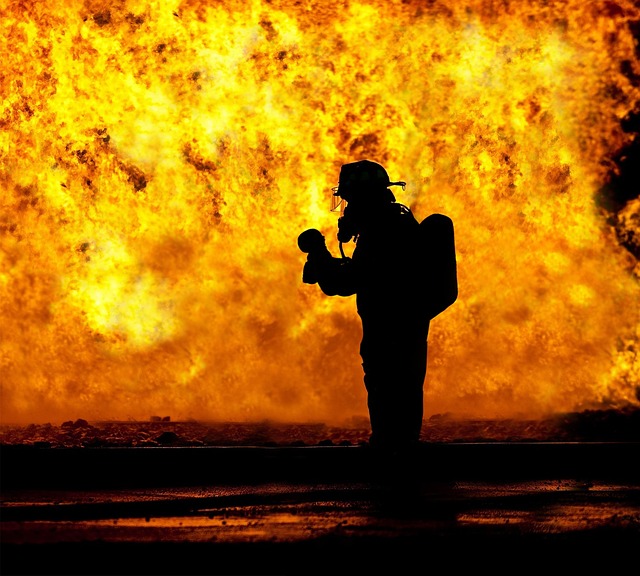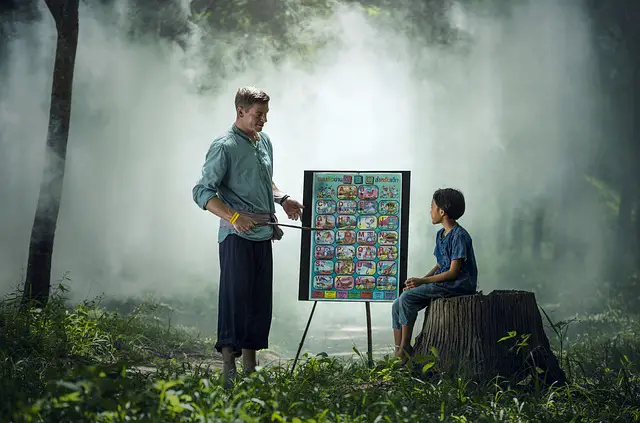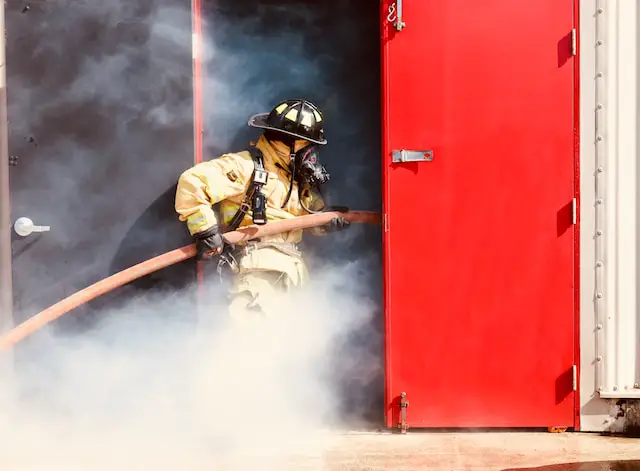Heroes are individuals who are admired for their exceptional achievements, bravery, or selflessness, while role models are individuals who set an example for others to follow through their positive attitudes, behaviors, and values. Heroes are celebrated for their extraordinary accomplishments, while role models can come from any walk of life and can be admired for a wide range of reasons.
The definition of a hero
(Image by Elias from Pixabay )

A hero is someone who is admired for their bravery, courage, or exceptional achievements, often in the face of great adversity. Heroes are often celebrated for their selflessness and their willingness to put their own well-being at risk for the sake of others, and they are typically individuals who have faced significant challenges and overcome them through extraordinary feats of strength or skill.
The definition of a role model
(Image by Sasin Tipchai from Pixabay )

A role model is someone who sets an example for others to follow through their positive attitudes, behaviors, and values. Role models can be individuals who have achieved success in their chosen fields or who have made significant contributions to their communities, and they are often admired for their integrity, kindness, or hard work. Role models can come from any walk of life and can be admired for a wide range of reasons.
Heroes Vs. Role models – Key differences
While the terms “heroes” and “role models” are often used interchangeably, there are some key differences between the two concepts.
A hero is someone who is admired for their bravery, courage, or exceptional achievements. Heroes are often celebrated for their selflessness and their willingness to put their own well-being at risk for the sake of others. They are typically individuals who have faced significant challenges and overcome them through extraordinary feats of strength or skill.
On the other hand, a role model is someone who sets an example for others to follow. Role models can be anyone who demonstrates qualities that others aspire to, such as integrity, kindness, or hard work. They can be individuals who have achieved success in their chosen fields or who have made significant contributions to their communities. Role models are often admired for their positive attitudes, behaviors, and values.
The main difference between heroes and role models is that heroes are often celebrated for their exceptional accomplishments, while role models are admired for their positive qualities and behaviors. Heroes are often individuals who have achieved something extraordinary in a particular field, while role models can come from any walk of life and can be admired for a wide range of reasons.
While heroes and role models can both be sources of inspiration and admiration, they differ in the qualities that they are celebrated for. Heroes are typically admired for their exceptional accomplishments, while role models are admired for their positive qualities and behaviors.
Examples of heroes and role models
Here are some examples of heroes and role models:
Heroes:
- Firefighters who risk their lives to save others from burning buildings.
- Soldiers who serve their country in times of war, often in dangerous and challenging conditions.
- Medical professionals who work tirelessly to save lives, especially during times of crisis like natural disasters or pandemics.
- Activists who fight for social justice and equality, often at great personal risk.
- Athletes who achieve extraordinary feats of strength, skill, or endurance, inspiring others through their dedication and hard work.
Role models:
- Teachers who inspire and motivate their students to learn and grow.
- Parents who model positive behaviors and values for their children, teaching them to be kind, compassionate, and respectful.
- Business leaders who prioritize ethics, social responsibility, and sustainability in their decision-making.
- Artists, musicians, and writers who use their talents to uplift and inspire others.
- Community volunteers who give their time and energy to help those in need, often without seeking recognition or reward.
Heroes in pop culture
Heroes in pop culture are fictional characters who embody heroic qualities and often possess exceptional skills or powers that enable them to overcome challenges and save the day. Here are some examples of heroes in pop culture:
Superman: A comic book superhero who possesses incredible strength, speed, and the ability to fly, and uses his powers to protect the innocent and fight evil.
Wonder Woman: A warrior princess from the island of Themyscira who possesses superhuman strength, agility, and combat skills, and fights for justice and equality.
Harry Potter: The protagonist of the popular book and film series, who discovers that he is a wizard and uses his magical abilities to battle dark forces and save the wizarding world.
Katniss Everdeen: The main character of the Hunger Games trilogy, who volunteers to take her sister’s place in a deadly competition and becomes a symbol of rebellion against a tyrannical government.
Black Panther: A superhero from the fictional African nation of Wakanda, who possesses superhuman strength, agility, and senses, and uses his advanced technology and combat skills to defend his people and fight for justice.
These characters and others like them have become cultural icons, inspiring generations of fans with their bravery, selflessness, and determination in the face of adversity.
Role models in pop culture
Role models in pop culture are fictional or real-life figures who are admired for their positive attitudes, behaviors, and values, and who set an example for others to follow. Here are some examples of role models in pop culture:
Mr. Rogers: The beloved host of the children’s television show “Mr. Rogers’ Neighborhood,” who was known for his kindness, empathy, and messages of acceptance and self-love.
Princess Leia: A character from the “Star Wars” franchise who is a leader in the Rebel Alliance, and who is brave, resourceful, and fiercely independent.
Moana: The protagonist of the Disney film “Moana,” who is a strong-willed and compassionate young woman who sets out on a quest to save her people and restore balance to the world.
Dwayne “The Rock” Johnson: A former professional wrestler turned actor, producer, and entrepreneur, who is known for his positive attitude, work ethic, and commitment to helping others. He frequently uses his social media platforms to motivate and inspire his followers, and has been involved in numerous philanthropic initiatives.
Should celebrities be considered role models or heroes?
Whether or not celebrities should be considered role models or heroes is a matter of personal opinion, and there are arguments for both sides.
On the one hand, many people look up to celebrities as role models because they are often in the public eye and have a large platform to influence others. Celebrities can use their platform to advocate for important causes and inspire positive change, and many do so. Additionally, celebrities may be admired for their talent, hard work, and success in their chosen field, which can serve as inspiration for others to pursue their own dreams.
On the other hand, some people argue that celebrities should not be automatically considered role models or heroes simply because they are famous. Celebrities are human beings with flaws and imperfections, and their personal lives are often subject to intense scrutiny and media attention. Just because someone is talented or successful in their profession does not necessarily mean they are a good role model, particularly if their behavior or actions are not in line with positive values and morals.
Ultimately, it is up to each individual to decide whether they see celebrities as role models or heroes, based on their own values and beliefs. However, it’s important to remember that true heroes are often found in everyday people who quietly and selflessly work to make a positive impact on the world around them.
What are the characteristics of a hero?
The characteristics of a hero can vary depending on the context and situation, but some common traits include:
Courage: Heroes are often willing to take risks and face danger in order to protect others or achieve a greater good.
Selflessness: Heroes are motivated by a desire to help others, rather than personal gain or recognition.
Determination: Heroes are often tenacious and persevering in the face of obstacles or adversity.
Compassion: Heroes have empathy and concern for the well-being of others, and are often driven by a sense of justice or fairness.
Humility: Heroes do not seek attention or praise for their actions, and often downplay their own accomplishments.
Integrity: Heroes are guided by a strong sense of morality and principles, and are committed to doing what is right, even when it is difficult or unpopular.
Sacrifice: Heroes are often willing to make personal sacrifices or endure hardship in order to achieve their goals or help others.
Leadership: Heroes often inspire and motivate others to act courageously and make a positive impact in their communities.
Heroes are characterized by their willingness to put the needs of others before their own and to act with courage and compassion in the face of challenges.
What are the characteristics of a role model?
The characteristics of a role model can vary depending on the individual and their sphere of influence, but some common traits include:
Positive values: Role models typically exhibit strong ethical and moral values that align with their beliefs and principles.
Integrity: Role models act in accordance with their values and principles, and are honest and transparent in their actions and decisions.
Success: Role models often have achieved success in their chosen field, and their achievements can inspire others to pursue their own goals.
Empathy: Role models are able to relate to others and understand their perspectives, which allows them to offer guidance and support.
Responsibility: Role models take responsibility for their actions and are accountable for their decisions.
Humility: Role models are modest and do not seek attention or praise for their accomplishments.
Resilience: Role models are able to bounce back from setbacks and challenges, and are able to maintain a positive attitude in the face of adversity.
Empowerment: Role models empower others to take positive action and make a difference in their communities and the world at large.
Role models are characterized by their ability to inspire and motivate others through their positive values, integrity, success, and empathy. They serve as examples for others to follow, and can have a profound impact on the lives of those they influence.








